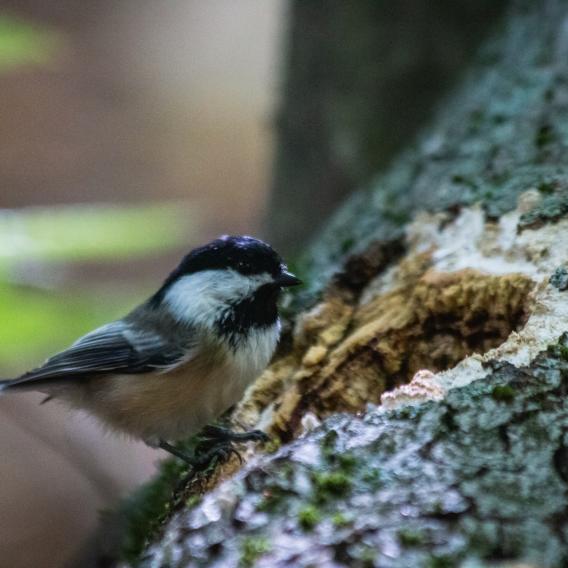Ecological corridors help maintain the integrity of ecosystems and function as bridges between protected and conserved areas. By promoting the coexistence of humans and wildlife, corridors connect important habitats on private woodlands with existing protected and conserved areas. MTRI is working with local rightsholders, Wasoqopa'q First Nation (WFN), land stewards, and partners including the Nova Scotia Working Woodlands Trust (NSWWT) and the Nova Scotia Nature Trust, to support connectivity initiatives within the region. There are several ways to become involved:
MTRI offers financial incentives to woodland stewards who wish to help protect some of the province’s most at-risk species through its Woodlands for Wildlife program. Woodlands for Wildlife applies to woodlands that contain known habitat for at-risk birds, reptiles, lichens, and tree species and provides participants with habitat surveys, species at risk expertise, and individualized mapping services.
Woodlands for Wildlife is a 3-year program being piloted by MTRI that uses annual financial incentives and landowner recognition to encourage the protection of significant habitat for species at risk on private woodlands in southwest Nova Scotia. The program currently applies to a total of 20 at-risk birds, turtles, lichens, and tree species and works with woodland owners to establish effective buffers around significant species at risk habitat, in addition to a series of species-specific beneficial management practices, such as limiting silviculture and road maintenance during critical breeding seasons.
Southwest Nova Scotia has been designated as a UNESCO Biosphere Reserve and Priority Place due to its unique value for biodiversity, supporting over 75% of the provinces' species at risk. With private woodlands comprising over 50% of the forested land in southwest Nova Scotia, the stewards of these woodlands represent an important and powerful force in species at risk conservation. Incentive programs have been quite successful in the agricultural industry and in other parts of the world for species at risk conservation. Finding new ways of partnering with woodland owners in species at risk conservation efforts is therefore a high priority.
For more information about the Woodlands for Wildlife Program and how to qualify, contact wfw@merseytobeatic.ca
Two thirds of our forests in Nova Scotia are privately owned and throughout our years of species at risk research we've listened to landowners about the need for support in managing private woodlands for biodiversity. We heard your thoughts and are developing a Biodiversity Assessment Tool to assess the special features and wildlife habitats on a woodlot. The assessment looks at a variety of ecological features such as tree species, tree ages and heights, forest dead wood and special habitats like wetlands, watercourses and old forests. All these features can go hand in hand with active forest management and our tool uses this information to recommend practices that ensures these special characteristics are maintained or improved.
Kespukwitk (Southwest Nova Scotia) is a biodiversity hotspot and one of 11 Priority Places under the Pan-Canadian approach to transforming species at risk stewardship in Canada. The Kespukwitk Conservation Collaborative (KCC) is a collection of partners focused on coordinating conservation in Kespukwitk. The KCC is focused on building relationships with municipalities to work towards species at risk conservation by providing support and resources, including the development of a municipal stewardship toolkit. We are empowering municipalities to contribute directly to long-term species at risk stewardship in Kespukwitk.
Learn more about the Kespukwitk Conservation Collaborative here.




